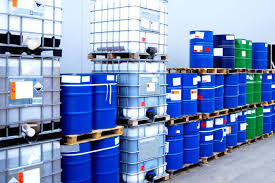

Water Engineering Technologies offers a great variety of chemicals for the chemical treatment of water. Our treatment programs use specialty chemicals to remove pollutants, minimize sludge handling and disposal costs, improving effluent quality, and promote water savings and recycling. The different types of water treatment chemicals we offer are summed up below.
Boiler Chemicals: Boiler internal treatment chemicals maintain clean boiler tube surfaces and minimize corrosion – reducing the chance of overheating or failure. Control of corrosion and deposition helps increase plant reliability and availability, protects equipment, and reduces maintenance and fuel costs. In addition to controlling deposition and reducing corrosion, some treatment chemicals can reduce the tendency for boiler water to carry over to the steam - protecting superheaters and steam turbines from damage. Boiler water chemicals include all chemicals that are used for the following applications:
Water Engineering Technologies offers extensive range of high performance organic and inorganic coagulants to significantly enhance the coagulation of suspended solids across a range of industrial applications involving process water treatment, wastewater and effluent treatment.This includes both organic and inorganic coagulants, high and very high molecular weight cationic and anionic polymer liquids and powders. Generally aluminium and iron are applied, aluminium as Al2(SO4)3- (aluin) and iron as either FeCl3 or Fe2(SO4)3-. One can also apply the relatively cheap form FeSO4, on condition that it will be oxidised to Fe3+ during aeration.
Anti Scalants:Scale is the precipitate that forms on surfaces in contact with water as a result of the precipitation of normally soluble solids that become insoluble as temperature increases. Some examples of scale are calcium carbonate, calcium sulphate, and calcium silicate.
Scale inhibitors are surface-active negatively charged polymers. As minerals exceed their solubility's and begin to merge, the polymers become attached. The structure for crystallisation is disrupted and the formation of scale is prevented. The particles of scale combined with the inhibitor will then be dispersed and remain in suspension.
Water Engineering Technologies offers extensive range of advanced technology antiscalants and antiscalant water treatment chemicals to manage the problems associated with hard water, specifically hardness salts and the formation of scale across a wide range of commercial, industrial and process environments.
Disinfectants: Disinfectants kill present unwanted microrganisms in water. There are various different types of disinfectants:
Chlorine dioxide disinfection:
ClO2 is used principally as a primary disinfectant for surface waters with odor and taste problems. It is an effective biocide at concentrations as low as 0.1 ppm and over a wide pH range. ClO2 penetrates the bacterial cell wall and reacts with vital amino acids in the cytoplasm of the cell to kill the organisms. The by-product of this reaction is chlorite. Chlorine dioxide disinfects according to the same principle as chlorine, however, as opposed to chlorine, chlorine dioxide has no harmful effects on human health.
Hypochlorite disinfection:
Hypochlorite is aplied in the same way as chlorine dioxide and chlorine. Hypo chlorination is a disinfection method that is not used widely anymore, since an environmental agency proved that the Hypochlorite for disinfection in water was the cause of bromate consistence in water.
Ozone disinfection:
Ozone is a very strong oxidation medium, with a remarkably short life span. It consists of oxygen molecules with an extra O-atom, to form O3. When ozone comes in contact with odour, bacteria or viruses the extra O-atom breaks them down directly, by means of oxidation. The third O-atom of the ozone molecules is than lost and only oxygen will remain.
Disinfectants can be used in various industries. Ozone is used in the pharmaceutical industry, for drinking water preparation, for treatment of process water, for preparation of ultra-pure water and for surface disinfection. Chlorine dioxide is used primarily for drinking water preparation and disinfection of piping.
Corrosion Inhibitors:
Water Engineering Technologies offers technically advanced corrosion inhibitors to be used across a wide range of commercial, industrial and process applications. Our specialist corrosion inhibitors help manage and control the unwanted problems associated with harsh, corrosive environments that often develop within industrial and process systems.
Our superior quality corrosion inhibitor products and specialty chemicals focus on reducing the detrimental effects of corrosion on plant and equipment, helping to reduce down-time and improve operational efficiency by offering readymade solutions to the problems associated with such corrosive environments. Corrosion Inhibitors fall in to five main types.
Neutralizing Agents:
Neutralization is a chemical reaction whereby an acid and a base react to form water and a salt. To neutralize acids and basics either sodium hydroxide solution (NaOH), calcium carbonate, or lime suspension (Ca(OH)2) are used to increase pH levels. Diluted sulphuric acid (H2SO4) or diluted hydrochloric acid (HCl) are used to decline pH levels. The dose of neutralizing agents depends upon the pH of the water in a reaction basin.
PH Conditioner:
pH-adjustment is done in order to prevent corrosion from pipes and to prevent dissolution of lead into water supplies. During water treatment pH adjustments may also be required. The pH is brought up or down through addition of basics or acids. For example, lowering the pH is done by the addition of hydrogen chloride, in case of a basic liquid. For bringing up the pH, addition of natrium hydroxide, in case of an acidic liquid.
Flocculants:
Water Engineering Technologies offers extensive range of high performance cationic and anionic flocculants have to significantly enhance the flocculation of suspended solids across a range of industrial applications involving process water treatment, wastewater and effluent treatment.
Our extensive range of technically advanced flocculants includes high, medium and low molecular weight cationic and anionic polymers in both liquid and powder forms.
Oxidants: Oxidants aid in reducing COD/BOD levels, and to remove both organic and oxidisable inorganic components. A wide variety of oxidants are available. A few of them are